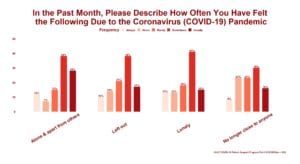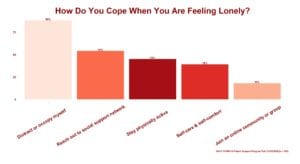Early in the pandemic, the Global Healthy Living Foundation (GHLF) started an online COVID-19 Patient Support Program to provide news, information, advice, and support for people living with chronic illness. The program is free and you can still sign up here.
Members of our program have underlying health issues — such as inflammatory arthritis and other autoimmune conditions, heart disease, lung disease, diabetes, and more — that may increase their risk for COVID-19 complications. They are interested in understanding the best ways to stay safe during the pandemic and to be part of a community of people with similar concerns, questions, and fears.
We regularly poll members, who live in the U.S. as well as around the globe, about a variety of topics, including how the pandemic is affecting their lifestyle, mental health, chronic disease management, medication adherence, and more.
We use this information to inform the educational resources we provide and to inform other stakeholders — such as public health experts, policymakers, advocacy groups, health care professionals, and pharmaceutical companies — about chronic illness patients’ needs and concerns.
Here are the results of our poll about how our members are emotionally coping during the pandemic.
Conducted: December 22-25, 2020
Number of respondents: 333
What We Asked
The coronavirus (COVID-19) pandemic has forced many people in our community into a more isolated lifestyle. People living with chronic illness may be more prone to feelings of loneliness to begin with, such as when symptoms like pain and fatigue prevent engaging in typical social activities. During the pandemic, people with underlying health issues may be isolating and limiting social interactions even more strictly than others. They may also feel as though others don’t understand their concerns about being at increased risk and how that is affecting their behavior during the pandemic.
All of this can have adverse effects on mental health. We were interested to see whether our members report experiencing isolation and loneliness over the past month and how they are coping with those emotions.
We asked:
In the past month, please describe how often (never, rarely, sometimes, usually, always) you have felt the following due to the coronavirus (COVID-19) pandemic:
- Alone and apart from others
- Left out
- No longer close to anyone
- Lonely
We were also interested to know what our members do to cope with feeling lonely and how well they have been coping throughout the pandemic. We asked:
- How do you cope when you are feeling lonely?
- How well have you been coping during the pandemic?
In addition to these questions, we gave participants the opportunity to share their thoughts about coping with loneliness and isolation during the pandemic in an open-ended response.
What We Learned
There were 333 respondents to the poll. Among those respondents, the reported rates of the following feelings are:


Alone and apart from others
- 7%: Never
- 15%: Rarely
- 38%: Sometimes
- 28%: Usually
- 12%: Always
Left out
- 14%: Never
- 21%: Rarely
- 38%: Sometimes
- 17%: Usually
- 10%: Always
No longer close to anyone
- 23%: Never
- 23%: Rarely
- 30%: Sometimes
- 16%: Usually
- 8%: Always
Lonely
- 13%: Never
- 18%: Rarely
- 41%: Sometimes
- 15%: Usually
- 13%: Always
Addressing Feelings of Loneliness
A large majority of our members prefer to distract or occupy themselves to cope with feeling lonely (88 percent). Here are the other responses:
- 45%: Stay physically active (exercise, walk, yoga, hike, maintain my garden or foliage)
- 18%: Join an online community or group (support groups/communities, enroll in an online course)
- 54%: Reach out to my social support network (call family and friends, FaceTime, or Zoom with friends, play online virtual games)
- 39%: Self-care and self-comfort (meditate, take a bath, have a self-spa day)
How Well People Say They Have Been Coping
Despite the degree of self-reported loneliness, respondents said they have been coping fairly well. The majority (61 percent) reported they are doing okay but could be better, while 25 percent said they have been coping very well. Twelve percent of people said that they have not been coping well.
What This Tells Us
Living through the pandemic has presented significant challenges for many people. Beyond the feelings of loneliness reported in this survey, our members have previously reported feelings of anxiety, sadness, and lack of focus.
But in participants’ free responses, we saw themes of resilience and trying to fight back against loneliness and other hardships.
- “I’ve been reminding myself to take this one day at a time, focusing on what I can control and trying to release worries about what I can’t control. Also restricting consumption of ‘news’ related to COVID and social media is helpful.”
- “Feeling anxious, alone, no concentration to do work, or even watching TV, feeling depressed. I’m back on antidepressants. Walk in the park is the only exercise I can tolerate. At the moment my concentration seems to be better due to making a lot of effort to accept what’s going on, plus the medication.”
- “I have come to truly appreciate the Zoom technology. The ability to ‘get together’ and ‘see’ my friends has been a wonderful boost during this difficult time.”
- “Play the ‘Glad Game’ I’ve played this all my life, and it just means that whatever us wrong or bad about things, you can always find something to be glad about. It might be something small, like the sun’s shining or an unexpected phone call, but it helps. It’s a state of mind to get into, and soon you’ll do it without even thinking about it. I’ve not been out of my flat since March 9, and I’m doing fine. Hope this helps.”
- “I utilize my doctor appointments as occasions to dress up and socialize. Sometimes, when extreme cabin fever hits, I drive my SUV to a shopping center parking lot and sit in the sun, read a book, listen to great 60s rock n roll, and maybe, just a little, ‘dance’ in my seat. However, I really miss being with people. Ten months is a long time without social interaction and a bit of fun.”
- “Being an introvert has made things easier for me. I’m okay being alone and tend to be a bit of a loner anyway. Being adaptable has been a huge help. Being open to change, flexible, and believing that this is a temporary situation all are key to maintaining good mental health.”
- “It has been important for me to stay in touch with my mental health professionals. They have helped me tremendously!”
The responses to this poll demonstrate that although feelings of loneliness and isolation are common in our community, our members utilize different tools and techniques to help them cope. This, in turn, may help them feel as though they are handling their circumstances well or okay despite acknowledging that they are lonely or isolated.
That said, it’s important to pay attention to your mental health and recognize whether feelings of isolation, sadness, anxiety, lack of focus, or others are interfering with your ability to live your life. Please check out the resources below if you or someone you know may need help.
Get Mental Health Support
We understand how difficult it can be to cope during these uncertain times, especially when you are living with chronic illness. It is important to talk to someone who can help. You should contact your primary care physician or your insurance provider to learn about the supportive resources that are available to you. Here are other mental health resources for your reference:
- To find local support groups and services, you can call 1-800-950-NAMI (6264) or email info@nami.org. The National Alliance on Mental Illness HelpLine can be reached Monday through Friday, 10 AM to 6 PM ET.
- For a counselor or therapist in your area, view the resources page at Mental Health America: Finding Therapy.
- If your mental health concern is an emergency for you or someone else, you should call 911.
- If you are having suicidal thoughts or have or are thinking of hurting yourself , you should call the National Suicide Prevention Lifeline’s 24-hour toll-free crisis hotline, 1-800-273-TALK (8255).
Get Free Coronavirus Support for Chronic Illness Patients
Join the Global Healthy Living Foundation’s free COVID-19 Support Program for chronic illness patients and their families. We will be providing updated information, community support, and other resources tailored specifically to your health and safety. Join now.






